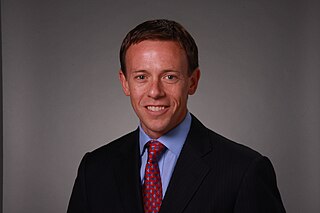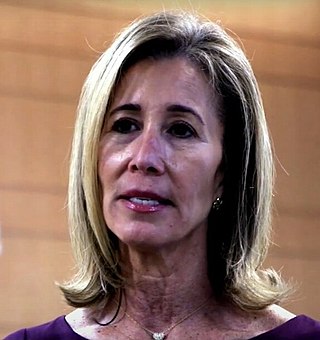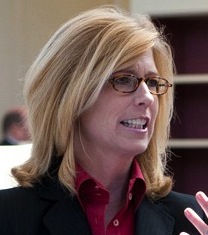
The Defense of Marriage Act (DOMA) was a United States federal law passed by the 104th United States Congress and signed into law by President Bill Clinton on September 21, 1996. It banned federal recognition of same-sex marriage by limiting the definition of marriage to the union of one man and one woman, and it further allowed states to refuse to recognize same-sex marriages granted under the laws of other states.

The Federalist Society for Law and Public Policy Studies (FedSoc) is an American conservative and libertarian legal organization that advocates for a textualist and originalist interpretation of the U.S. Constitution. Headquartered in Washington, D.C., it has chapters at more than 200 law schools and features student, lawyer, and faculty divisions; the lawyers division comprises more than 70,000 practicing attorneys in ninety cities. Through speaking events, lectures, and other activities, it provides a forum for legal experts of opposing conservative views to interact with members of the legal profession, the judiciary, and the legal academy. It is one of the most influential legal organizations in the United States.

Ira William McCollum Jr. is an American lawyer and Republican Party politician. He was a member of the United States House of Representatives from 1981 to 2001, representing Florida's 5th congressional district, which was later redistricted to the 8th congressional district in 1993. As a member of the House, McCollum rose to become Vice Chairman of the House Republican Conference, the fifth-highest ranking position in the House Republican leadership. He voted to impeach President Bill Clinton and subsequently took a leadership role in managing Clinton's trial in the Senate, which ended in acquittal.

Michele Marie Bachmann is an American politician who was the U.S. representative for Minnesota's 6th congressional district from 2007 until 2015. A member of the Republican Party, she was a candidate for president of the United States in the 2012 election, but dropped out after the Iowa Caucus.

Katherine Anne Castor is an American politician and lawyer currently representing Florida's 14th congressional district in the United States House of Representatives, serving since 2007. The district, numbered as the 11th district from 2007 to 2013, is based in Tampa. A Democrat, Castor was a member of the Hillsborough County Commission.
Sandra Lea Lynch is an American lawyer who serves as a senior United States circuit judge of the United States Court of Appeals for the First Circuit. She is the first woman to serve on that court. Lynch served as chief judge of the First Circuit from 2008 to 2015.

Thomas Edward Perez is an American politician and attorney currently serving as senior advisor to the president of the United States and director of the White House Office of Intergovernmental Affairs, holding both positions since June 2023. Perez previously served as the United States Secretary of Labor (2013–2017), the chair of the Democratic National Committee (2017–2021), and United States Assistant Attorney General for Civil Rights (2009–2013).

Melody C. Barnes is an American lawyer and political advisor. Formerly an aide and chief counsel to Senator Edward M. Kennedy on the Senate Judiciary Committee, Barnes later worked at the Center for American Progress, a think tank, before joining Senator Barack Obama's 2008 presidential campaign. After Obama took office as president, Barnes was appointed director of the Domestic Policy Council, serving in that post from January 2009 to January 2012. After leaving the White House, Barnes assumed roles at the Aspen Institute and New York University. Since 2016, she has been at the University of Virginia, where she teaches law and is the co-director of the UVA Democracy Initiative.
Dawn Elizabeth Johnsen is an American lawyer and the Walter W. Foskett Professor of Constitutional law, on the faculty at Maurer School of Law at Indiana University in Bloomington, Indiana. She previously served in the Biden administration as Acting Attorney General at the Office of Legal Counsel, having been appointed on January 20, 2021, by President Joe Biden, to return to the role she previously held in the Clinton administration. She was succeeded in that role in a permanent capacity by Christopher H. Schroeder, and is currently serving as the Principal Deputy Assistant Attorney General in the same office.

David Boris Rivkin Jr. was an American attorney, political writer, and conservative media commentator on matters of constitutional and international law, as well as foreign and defense policy. Rivkin gained national recognition as a representative of conservative viewpoints, frequently testifying before congressional committees, and appearing as an analyst and commentator on a variety of television and radio stations. He was a visiting fellow at the Center for the National Interest, and a recipient of the U.S. Naval Proceedings Annual Alfred Thayer Mahan Award for the best maritime affairs article. He was a fellow at the Foundation for Defense of Democracies, and was a member of the Sub-Commission on the Promotion and Protection of Human Rights of the United Nations Commission on Human Rights.

Joseph W. Jacquot is the general counsel to the governor of the State of Florida. Previously Jacquot was the chief deputy attorney general of the State of Florida from 2007 to 2011. He successfully argued before the United States Supreme Court in the landmark Miranda warning case Florida v. Powell and initiated the constitutional lawsuit against the Affordable Care Act ("Obamacare").

Richard B. "Rich" Nugent is an American retired law enforcement officer and former United States Congressman. He is a member of the Republican Party. He is a former Sheriff of Hernando County, Florida. On November 2, 2010, Richard Nugent defeated Democratic nominee James Piccillo, to replace retiring Congresswoman Ginny Brown-Waite. Nugent was a member of the Tea Party Caucus. On November 2, 2015, Nugent announced he would not seek reelection.
Pamela B. Gilbert is an American lawyer and has been a partner of the law firm Cuneo Gilbert & LaDuca, LLP since 2003, where she leads the firm's lobbying and public policy practice. She is a prominent consumer rights advocate who has testified before Congress over fifty times and has made numerous appearances in national media. Gilbert serves as the Executive Director and Legislative Counsel for the Committee to Support the Antitrust Laws (COSAL), an organization that supports antitrust legislation.

Patty Shwartz is a United States circuit judge of the United States Court of Appeals for the Third Circuit.
National Federation of Independent Business v. Sebelius, 567 U.S. 519 (2012), is a landmark United States Supreme Court decision in which the Court upheld Congress's power to enact most provisions of the Patient Protection and Affordable Care Act (ACA), commonly called Obamacare, and the Health Care and Education Reconciliation Act (HCERA), including a requirement for most Americans to pay a penalty for forgoing health insurance by 2014. The Acts represented a major set of changes to the American health care system that had been the subject of highly contentious debate, largely divided on political party lines.
Since the passage of the Affordable Care Act (ACA), there have been numerous actions in federal courts to challenge the constitutionality of the legislation. They include challenges by states against the ACA, reactions from legal experts with respect to its constitutionality, several federal court rulings on the ACA's constitutionality, the final ruling on the constitutionality of the legislation by the U.S. Supreme Court in National Federation of Independent Business v. Sebelius, and notable subsequent lawsuits challenging the ACA. The Supreme Court upheld ACA for a third time in a June 2021 decision.

Cornelia Thayer Livingston Pillard, known professionally as Nina Pillard, is an American lawyer and jurist serving since 2013 as a U.S. circuit judge of the United States Court of Appeals for the District of Columbia Circuit. Before becoming a judge, Pillard was a law professor at Georgetown University.

During Barack Obama's tenure as President of the United States from 2009 to 2017, certain Republican members of Congress, as well as Democratic congressman Dennis Kucinich, stated that Obama had engaged in impeachable activity and that he might face attempts to remove him from office. Rationales offered for possible impeachment ranged from Obama allowing people to use bathrooms based on their gender identity, to the 2012 Benghazi attack, to Obama's enforcement of immigration laws, and false claims that he was born outside the United States.

Robin Lee Rosenberg is a United States district judge of the United States District Court for the Southern District of Florida and former Florida circuit court judge.
United States House of Representatives v. Azar, et al. was a lawsuit in which the United States House of Representatives sued departments and officials within the executive branch, asserting that President Barack Obama acted illegally in his implementation of the Patient Protection and Affordable Care Act. The lawsuit was touted by House Speaker John Boehner, and asserted that President Obama exceeded his constitutional authority in delaying the implementation of the employer mandate of the Affordable Care Act and also addressed "Republican opposition to an estimated $175 billion in payments to insurance companies over the next 10 years as part of a cost-sharing program under the healthcare law."














